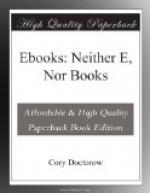Tool-makers and software designers are increasingly aware of the notion of “affordances” in design. You can bash a nail into the wall with any heavy, heftable object from a rock to a hammer to a cast-iron skillet. However, there’s something about a hammer that cries out for nail-bashing, it has affordances that tilt its holder towards swinging it. And, as we all know, when all you have is a hammer, everything starts to look like a nail.
The affordance of a computer — the thing it’s designed to do — is to slice-and-dice collections of bits. The affordance of the Internet is to move bits at very high speed around the world at little-to-no cost. It follows from this that the center of the ebook experience is going to involve slicing and dicing text and sending it around.
Copyright lawyers have a word for these activities: infringement. That’s because copyright gives creators a near-total monopoly over copying and remixing of their work, pretty much forever (theoretically, copyright expires, but in actual practice, copyright gets extended every time the early Mickey Mouse cartoons are about to enter the public domain, because Disney swings a very big stick on the Hill).
This is a huge problem. The biggest possible problem. Here’s why:
[CHART: HOW BROKEN COPYRIGHT SCREWS EVERYONE]
* Authors freak out. Authors have been schooled by their peers that strong copyright is the only thing that keeps them from getting savagely rogered in the marketplace. This is pretty much true: it’s strong copyright that often defends authors from their publishers’ worst excesses. However, it doesn’t follow that strong copyright protects you from your readers.
* Readers get indignant over being called crooks. Seriously. You’re a small businessperson. Readers are your customers. Calling them crooks is bad for business.
* Publishers freak out. Publishers freak out, because they’re in the business of grabbing as much copyright as they can and hanging onto it for dear life because, dammit, you never know. This is why science fiction magazines try to trick writers into signing over improbable rights for things like theme park rides and action figures based on their work — it’s also why literary agents are now asking for copyright-long commissions on the books they represent: copyright covers so much ground and takes to long to shake off, who wouldn’t want a piece of it?




